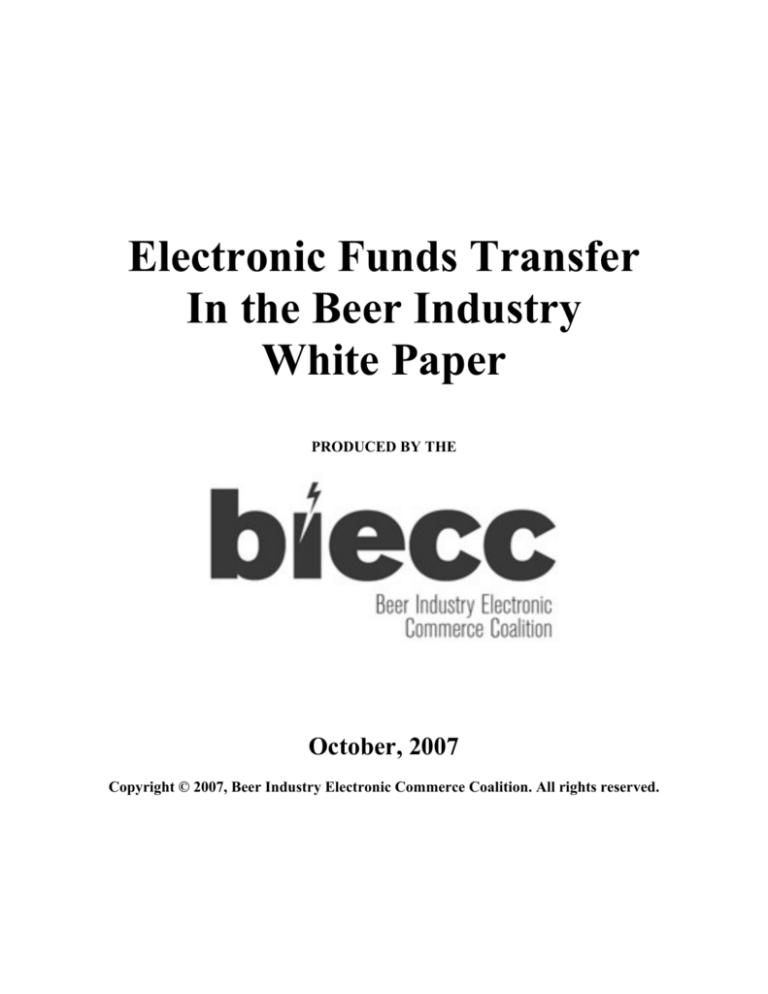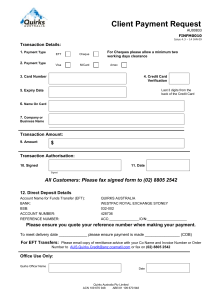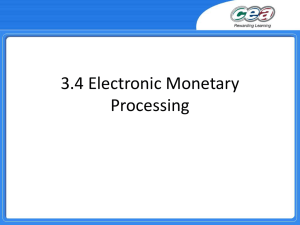
Electronic Funds Transfer
In the Beer Industry
White Paper
PRODUCED BY THE
October, 2007
Copyright © 2007, Beer Industry Electronic Commerce Coalition. All rights reserved.
INTRODUCTION
Technology is reshaping the way that consumers and businesses conduct their financial
operations, including transmitting information and handling financial transactions. Banks and
financial service companies have adopted new technologies to improve their financial offerings –
such as electronic banking and payment methods for goods and services. Indeed, eCommerce is
now bringing these enhancements to the Internet. As the Internet continues to transform
commercial transactions as we have known them, the “method-of-payment” is one bothersome
concept that will take on an increasingly significant role in the relationship between seller and
buyer. The underlying goal of the automated environment is to wring out costs inherent in the
business processes so that retailers and distributors can experience joint savings. Retailers are
currently offered payment choices, but Electronic Funds Transfer (EFT) is one choice that
includes both efficiency and cost reduction.
EFT is the electronic transfer of funds between a buyer, seller and his/her respective financial
institution. EFT allows parties to move money from one account to another account, replacing
traditional check writing and cash collection procedures. EFT services have been available for
two decades, but with the increased interest in Internet business, more and more consumers and
businesses have begun to utilize them.
In the settlement between parties, EFT transactions usually function via an internal bank
transfer from one party’s account to another or via the U.S. Federal Reserve Board’s Automated
Clearing House (ACH) network. The Federal Reserve created the ACH system to protect and
secure the use of electronic transactions, and to allow parties to maintain bank accounts with any
affiliated financial institution that is a member of the National Automated Clearing House
Association (NACHA). The network is regulated by the Federal Reserve and is also governed by
operating rules adopted by NACHA. The ACH network has become the largest electronic
payments system in the country. EFT and ACH are often used interchangeably.
During the past decade, a number of states have passed laws regulating the use of EFT for
licensed beverage transactions. While differences exist from state to state, where permitted, EFT
is increasingly used by beer distributors to handle transactions with retailers.
An EFT payment system appeals to distributors for various reasons. Although each
distributor's operation may be different, an electronic funds transfer is still likely to deliver value
in many ways. For some distributors, value may be the more efficient use of their personnel and
for others; value may be the realized dollar-labor savings. Additional benefits will be described
throughout this document. No matter which benefit applies, distributors will undoubtedly enjoy
the convenience and the security inherent in EFT transactions. Wholesale and retail trading
partners already engaged in EFT transactions have found the process to be convenient and an
excellent way for distributors to collect payments.
This White Paper is intended to present the basics about EFT. It is structured to provide beer
distributors with general information from which to make decisions about if, when and how to
implement EFT. This document has been prepared by the Beer Industry Electronic Commerce
Coalition (BIECC), which is solely responsible for its content:
2
•
•
•
BIECC does not endorse any specific method of operation or any individual business that
may provide services described.
BIECC encourages individual distributors to check with knowledgeable counsel and
other representatives in the state or states in which their company operates, to make sure
that any specific EFT implementation complies with all applicable laws.
BIECC strongly suggests that each distributor:
♦ contact their suppliers to receive guidelines and recommendations and sources of
information;
♦ discuss the concepts and requirements for EFT with their Route Accounting Software
(RAS) Vendors to ensure that all requirements for the implementation process are
realistic; and
♦ check with their financial institution to ensure that appropriate banking procedures
are available and in place.
GENERAL EFT INFORMATION
EFT involves the electronic exchange of money. Fund transfers may be initiated by either
trading partner, with the most common exchanges involving the use of secure, financially
capable, third-party providers sending information over a Value Added Network (VAN) or over
the Internet.
In the past, many beer distributors have been reluctant to try EFT ― believing it is easier to
deal with checks, money orders or cash. However, as financial institutions and others have
offered electronic banking services, distributors have become aware that EFT is available and,
over the past few years, a number of distributors and retailers have incorporated EFT into their
business plans in those states where it is permitted.
How EFT Typically Works in Credit and Credit Prohibition States
Regardless of your company’s payment terms, at the time of delivery, the retailer verifies and
signs the distributor’s invoice or delivery ticket and the distributor leaves a hardcopy invoice
with the retailer. After the distributor reconciles the invoices for the day, what happens next
differs from state to state. This information is explained in more detail in “Various Methods for
Conducting EFT” beginning on page 5. Electronic payment methods are regulated by a credit
prohibition state’s respective Alcohol Beverage Control.
In Credit Prohibition States:
•
In some states, the distributor initiates the money transfer directly through their electronic
commerce process, once a delivery is made and an invoice is given to the retailer.
•
In other credit prohibition states, once the distributor provides an electronic or paper
invoice to a retailer, the retailer then initiates the funds transfer from its bank to the
distributor’s bank.
•
In still other states, a third-party provider may also initiate the transfer of funds between
the distributor and retailer bank accounts.
3
•
•
In most cases, the money transfers are processed through the Automated Clearing House,
resulting in available funds within the next business day.
Typically, in credit prohibition states, the transfer of funds must occur within a specified
time frame as required by state law or regulation.
In Credit States: When EFT transactions are characterized as “credit,” they are not required
to occur within 24 hours. Each state will generally provide the specific terms by which the
parties must abide; however, there may be a variety of options available under the applicable
state regulations. For example, a retailer may have the ability to pay all regulated items
electronically on a specified due date. A third-party provider may even guarantee the payment
date to provide better cash management for the distributor. This option automates a retailer’s
manual process and guarantees that payments are made on schedule, in accordance with
applicable state regulations.
REMEMBER TO CHECK WITH YOUR STATE ASSOCIATION TO ENSURE THAT
YOU ARE COMPLIANT WITH APPROPRIATE LAWS AND REGULATIONS.
Distributor Benefits
1. Saves time and money:
•
•
•
•
•
•
•
•
•
Potential savings are directly proportional to the number of customers who select
EFT as a payment option;
Drivers no longer need to wait for checks to be signed or cash to be counted;
An average time savings is 15 minutes per delivery stop, allowing drivers productive
use of their time;
Reduces back-tracking and double stops on routes so as to make delivery when a
check signer is available;
Reduces the risk of robbery by eliminating the amount of cash carried by drivers
(therefore, potentially reducing insurance costs);
Eliminates customary procedures for processing cash payments;
Reduces driver check-in time during reconciliation/settlement;
Reduces the time spent keying data and correcting errors; and
Eliminates lost checks and money orders.
2. Rapid exchange of invoice payment data:
•
•
•
Payment occurs exactly on the specified due date, which provides funds-in-hands on
settlement day rather than a delay of several days – float is reduced by up to three
days;
Improved cash flow – no more “check is in the mail” excuses; and
Payments can only be made on specified dates and for specified amounts.
3. Other benefits:
4
•
•
Current technology allows the distributor to offer the same EFT features to all
customers, regardless of their size; and
Faster notice of non-sufficient funds.
Retailer Benefits
1. Saves time and money:
•
•
•
Store managers and staff can focus less time on deliveries and more time on their
customers;
No longer must retailers maintain extra cash or checks on hand for regulated
deliveries; and
Drivers (and trucks) are in and out of the stores more quickly.
2. Rapid exchange of invoice payment data:
•
•
•
Corporate accounting centers and stores are able to maintain delivery data
electronically, including settlement information;
Data can be utilized for bank reconciliation; and
Allows retailers with multiple locations to track payments for deliveries through one
central source.
3. Simplified Reconciliation:
•
•
•
Electronic processing of invoice data and payment information makes it possible to
automatically post data directly to accounting systems;
Retailers do not need to have any special electronic commerce capabilities, all they
need is a bank account; and
Improves consistency of information since a retailer can receive updated information
from the bank on payments, rather than trying to reconcile cash register to payments
to vendors.
VARIOUS METHODS FOR CONDUCTING EFT
Below, we have described three different scenarios, each of which represents a way of
conducting EFT that exists today. Obviously, due to the technical nature of this process, other
forms or methods of EFT may already exist or may come into play in the future. Neither NBWA
nor the BIECC endorses any specific EFT solution – these examples are provided as illustrations
and for the purpose of explaining how the key EFT concepts operate under specific applications.
1. Services Provided Through a Local/National Bank
5
Today, almost every bank (local, regional or national) offers some form of EFT services. A
bank specialist will typically provide EFT software, training and support. A fee will likely be
charged. Information about this process is best obtained directly from a bank representative.
It is important to understand that if a distributor uses bank-provided software, the distributor
is still responsible to make sure his or her route accounting system (RAS) has the appropriate
interface to work with the bank software in order to maximize efficiencies and realize savings.
EFT is a widely used procedure and commonly available as an extra module with most RAS
packages.
The bank provided software is most often installed on the distributor’s computer and works
in combination with the distributor’s RAS system to collect the information needed to create the
proper files necessary for the EFT transactions. Transaction files created on the distributor’s
RAS system are mapped to a standard electronic document and transmitted electronically to the
bank system, notifying the bank system from which retailers’ accounts to withdraw money, the
amounts to be withdrawn and when to make the withdrawals. This information is sent
electronically from the bank to the ACH and the transactions are completed according to the
directed schedule. State laws dictate the terms for sale of licensed beverages, cash or credit,
which typically define the number of days allowed to affect the transfer of funds. Remember,
EFT payments must comply with each state’s regulations.
At the same time the money is transferred from the retailers’ accounts, it is deposited in the
distributor’s bank account and the distributor is notified electronically via the bank computer
system. The distributor’s RAS system will use the bank information to show that the retailer has
paid his or her bill and any account receivable records will be adjusted to reflect the correct
information.
2. Brewer-Facilitated Option
At present, only one brewer, Anheuser-Busch, has worked with a third party company to
develop and introduce a functioning EFT program for its distributors. Anheuser-Busch
distributors can contract with this third party company for EFT services. It is possible that other
brewers will follow this lead, although it appears that for the time being, the remaining brewers
have chosen to offer informational assistance to their distributors in the use of other
commercially available options.
In a typical situation, the distributor’s route accounting system captures enrolled e-payment
customers’ invoice data during end-of-day data processing and creates a computer file which
passes through a third-party value added network (VAN) before being received by a servicing
bank (also known as an intermediary bank). The servicing bank processes the file and forwards
to individual retailer banks the instructions for settling the invoice transaction balance due. Once
received, the distributor’s accounts receivable system is updated to settle the delivery.
To set-up and design the service for retailers, a distributor would work with their brewery
electronic commerce team and their route accounting software vendor to link the technology
necessary to successfully implement the process. The distributor may rely on well-established
6
methods from these parties, and simply must commit to the one-time investment in software
modules designed to make the solution a “turn key” one. Once in place, the distributor is ready
to rollout the new value-added service to any willing trading partner.
The advantage to this approach is the efficiency gained through the use of non-proprietary,
business standard eCommerce. To illustrate the process, a delivery person, typically using a
handheld computer, prepares either a paper or electronic invoice for receipt by the retailer. The
transaction data is captured in the handheld computer, and uploaded to the distributor’s route
accounting system for review by the distributor’s office staff. Upon distributor acceptance, the
data is currently forwarded to Electronic Data Systems (EDS), a value added network which
facilitates the translation of electronic information between business partners. EDS places the
data received into the distributor’s “mailbox”, for pickup by the current intermediary bank, the
Bank of America (BOA). The Bank of America takes the invoice data, and directs it to retailer’s
banks, requesting payment for the transaction. Once funds have been collected, BOA deposits
them into the distributor’s local bank account, and a computer file is received into the
distributor’s route accounting system, clearing the transaction balance due from the accounts
receivable system. This process clearly offers the seamless business to business integration
eCommerce retailers value.
An NBWA member distributor, using the Anheuser-Busch BudNET® electronic commerce
module, reported that his company’s EFT delivery volume in January 2001 was 720 deliveries
involving 127 customers. This diverse customer base has been developed over several years and
is truly experiencing the benefits previously described in this section. As an example of the
mutual economic benefit trading partners can achieve, using a conservative estimate of 15
minutes per driver stop, this scenario equates to slightly more than one full-time employee per
month, or the equivalent over 12 months of another employee on the payroll. If one were to add
that to the approximately 20 total minutes saved each day by the drivers and 20 minutes saved by
an office not having to count money, etc., that equates to an additional 14 man hours of savings
monthly. According to Randy Krug of Dale Lee Distributing Company in Cedar Rapids, Iowa,
“I've often told others EFT is just like any other product on our trucks; we must promote its
‘appeal’ in order to gain volume.”
A distributor should obtain brewery solution information and retailer “Sell-In” information
from his or her brewer. A distributor should not start working with a retailer until they fully
understand the capabilities of their software. These eCommerce partners charge on-going fees
for their electronic services.
3. Services from Third-Party Providers
In all states (excluding Massachusetts) and the District of Columbia, state approved third-party
providers may transfer money and data electronically for regulated retailers and distributors of
beer. Many retailers, ranging from one or two store convenience store operators to the major
retailers, use a third-party provider to handle their EFT transactions. A third-party provider may
furnish EDI compatible data and/or detailed customized reports to the retailer. The cost to the
retailer is determined by what services and detailed reports they have negotiated with the thirdparty provider. One such service provider is Fintech.
7
Third-party providers usually charge distributors a one-time set-up fee, an annual maintenance
and support fee and a transaction fee per invoice dependent on the number of invoices sent.
Distributors should obtain appropriate information from these vendors, and they should contact
their brewer to obtain information from other distributors who have used this type of provider.
How It Typically Works – At the time of delivery, the retailer verifies and signs the
distributor’s invoice or delivery ticket. Whenever possible, the delivery driver should make
the necessary modifications to the invoices (out of stock, breakage, etc.) and provide the
retailer a revised invoice. Both the retailer and the delivery driver retain a paper copy for
their records. Once the retailer has signed the distributor’s invoice at delivery, it becomes an
irrevocable commitment to pay (and the distributor will initiate payment in accordance with
the regulations). After the distributor reconciles the invoices for the day, then those invoices
for retailers using a third-party EFT payment provider are electronically sent to the thirdparty for payment processing.
In Credit Prohibition States: The third-party provider initiates the transferring of funds by
submitting fund transfer directives to the Federal Reserve. This directive results in a
simultaneous debit and credit from the retailer's bank account to the distributor's bank
account. It is important to note that the third-party provider should never take title to funds.
Since the third-party provider processes all invoice transactions through the Federal Reserve
System, available funds are transferred within the state regulated time frame.
In Credit States: A retailer has the ability to pay all regulated items electronically on a
specified due date in every credit state except for Massachusetts. Use of a qualified thirdparty provider can be a more reliable way to assure the timeliness of a payment on the
payment date than by using the U.S. mail, which is less reliable. More prompt payments
provide better cash management for the distributor and remove the potential of retailers
getting onto a no-sale list. This option automates a retailer’s manual process and guarantees
that payments are made on schedule according to state regulations.
The Process:
1. A distributor may have to install software to communicate with a third-party
provider (that software is usually offered by the third party for a fee). However, it
is desired that communication with the third-party provider utilize the Internet to
reduce transmission costs and eliminate the need for specific communication
software.
2. Distributors who already have Route Accounting System software can also use it
to move data between their business systems and their third-party provider.
Otherwise, such software may need to be installed. When evaluating a third-party
provider it is desired that they have a method for you to submit your invoices
even if you are having problems with your Route Accounting software (manual
entry).
3. All software and data formats should be fully tested before taking on the first
retail partner.
8
4. The distributor completes the appropriate file maintenance in his or her business
system to identify their customer as an EFT account.
5. Generally, the third-party provider establishes a “live” date with a retailer and the
distributor.
6. As of the “live” date, drivers are instructed not to collect currency, checks, money
orders or other negotiable instruments from the account (in a credit prohibition
state). Look for a third-party provider that furnishes best practices that can be
given to drivers that make this process much more efficient.
7. When the driver has completed the delivery and the retailer has signed the
invoice, an irrevocable commitment to pay has been established for that invoice.
8. After reconciling the invoices for the day, the distributor will electronically
extract from the business system all of the invoices delivered to EFT retailers.
9. Those invoices are then sent electronically to the third-party.
10. This step is what initiates a request for payment to the third-party provider to
collect the funds from the retailers on the distributor’s behalf. Therefore, invoices
should be sent to the third-party provider as soon as they are reconciled.
11. The third-party provider sends back a report to the distributor acknowledging
receipt of these invoices.
12. The next day, the distributor receives a bank report that reflects the sum total of
the deposit expected. The files received from the third-party provider should be
used to reconcile the distributor’s bank account.
13. Once the process is established for the first trading partner, adding more retailers
to the process is quick and easy. The more retail locations added to this
automated system, the more efficient the distributor system will become; and
larger savings will be realized.
ESTABLISHING EFT FOR YOUR BUSINESS
As discussed above, EFT is not legal in some states. Accordingly, there are a few simple
rules and procedures that you need to follow if you are contemplating establishing EFT with a
retailer. BIECC believes that if you follow this checklist, you can successfully implement EFT in
your business in an efficient manner.
Initiating EFT for Your Business:
1. Check with your State Regulatory Agency, state associations and legal counsel to find
out if EFT is legal in your state.
2. You should ensure which electronic payment methods have been approved by your State
Liquor Board/Commission – pay particular attention to how your state defines “Credit.”
3. Contact your supplier representative who is most familiar with electronic commerce and
ask for his or her guidance and support.
9
4. Communicate with and seek feedback from your Independent Software Vendors (ISVs)
or Route Accounting Software (RAS) Vendors regarding their electronic commerce
capabilities.
5. Regardless of how you intend to provide invoices to your customers, make sure that
invoices will be generated according to state regulations.
6. Evaluate available EFT solutions and complete necessary work required prior to startup.
7. Complete proper forms with your bank depending on option selected.
8. Meet with your retailers to understand the various needs and details involved on their end
of the business, and sell through the concept.
9. Set-up and conduct pilot tests with at least one retailer before trying to bring everybody
on-line at the same time.
10. Set production dates for revising the system and adding other retailers.
11. Initiate full electronic transactions – “Go Live.”
12. Continue to “sell” concept to additional retailers by:
a. Obtaining “sell-in” information from your brewer or third-party provider;
b. Working with existing retailers to build case studies showing positive results that
can be shared with other retailers;
c. Working with your EFT bank and EFT software provider to add new retailers to
the program; and
d. Arranging for testing with retailer before bringing a new retailer on line.
Fairness Guidelines for Establishing EFT
You may want to consider the following thoughts/principles when establishing EFT with
your retailers:
1. Be sure to use a written EFT agreement, which should contain all the terms and
conditions for conducting EFT with a retailer;
2. BIECC recommends that any EFT agreement between trading partners should be
voluntary;
3. BIECC supports the idea that each trading partner should bear its own costs for the
transaction unless otherwise provided for by state statute or regulation.
Along with exchanging funds, distributors may also exchange data about the purchase,
including an invoice, with the purchaser, without using paper. This process, known as Electronic
10
Data Interchange (EDI), also handles the notification when money is being transferred between
accounts by EFT. EDI is itself a standard using set message formats for delivering data. That
data can be delivered using value-added networks (VANs) or the interent. The current standards
for EFT/EDI used by the beer industry (called the "Uniform Communication Standard" or the
UCS Guidelines) have been developed and are maintained by the GS1-US. A more detailed
discussion of these technologies is being prepared in a separate White Paper on EDI by the
BIECC.
CONCLUSION
It is clear that an EFT payment system appeals to distributors for various reasons. Although
each distributor's operation is different, the use of electronic funds transfers are likely to deliver
value in many ways. For some distributors, value will come in the form of more efficient use of
personnel and in others; value may be realized through dollar-labor savings. A number of other
benefits have been described throughout this document. No matter which benefit applies,
distributors can undoubtedly enjoy the convenience and the security inherent in EFT
transactions. Distributors and retailers already engaging in EFT transactions find the process to
be convenient and easy. In sum, EFT is an excellent way for beer distributors to collect
payments.
11
GLOSSARY OF TERMS:
ACH Network
Automated Clearing House Network, a payment system to process large volumes of
individual payments electronically and is one of the largest payments system in the country.
It is a highly reliable and efficient nationwide batch-oriented electronic funds transfer system
governed by the NACHA OPERATING RULES which provide for the interbank clearing of
electronic payments for participating depository financial institutions. The American
Clearing House Association, Federal Reserve, Electronic Payments Network and Visa act as
ACH Operators, central clearing facilities through which financial institutions transmit or
receive ACH entries. In 1998, nearly 5.3 billion ACH transactions were processed with a
total value of more than $16 trillion.
BIECC
Beer Industry Electronic Commerce Coalition, a working group of brewers and distributors
created in February of 1994 by Anheuser-Busch, Coors, Miller, Stroh and NBWA to advance
the issue of electronic commerce. The coalition educates brewers, distributors and retailers about
the benefits of electronic commerce, promotes ANSI X-12 standards and monitors regulatory
concerns as they affect the three-tier system.
BOA
Bank of America, the first nationwide, coast-to-coast bank serving the financial needs of
individuals, businesses, government agencies and financial institutions in communities
throughout America and around the world.
BudNET®
BudNET®, a wide area network designed by Anheuser-Busch, Inc. to seamlessly
communicate throughout the 3-tier system using non-proprietary, accepted electronic
commerce standards.
Credit Prohibition State
By law, credit prohibition states prohibit the extension of credit by those parties licensed to
sell to a licensed retailer for the purchase of malt beverage products.
Some credit prohibition states do have limited exceptions to their laws. It is important to
check with your state associations and legal counsel to ensure that you are compliant with
your state laws and regulations.
Credit State
Generally speaking, statutes in a credit state allow for the extension of credit for a stipulated
number of days from a distributor to a retailer for the purchase of malt beverage products.
Once again, each state’s laws vary, so please consult your state association and legal counsel
to ensure that you are compliant with your states laws and regulations.
12
EDI
Electronic Data Interchange, the computer-to-computer exchange of business information in a
standard public format.
EDS
Electronic Data Systems, a value added network which facilitates the translation of electronic
information between business partners.
EFT
Electronic Funds Transfer, the electronic (paperless) transfer of funds between a business
and its financial institution, or between two individual entities’ accounts. EFT allows parties
to move money from one account to another account, replacing traditional billing and
collection procedures. This electronic process is variously known by such terms as funds
sweep, wire transfer, direct debit, direct credit, direct deposit or automated payment.
ISV
Independent Service Vendor, a method for invoicing, pricing of product, sales tracking and
customer reporting.
NACHA
National Automated Clearing House Association, provides benefits to its members and other
payments system stakeholders in the development, promotion and use of electronic solutions
to improve the payments system.
NBWA
National Beer Wholesalers Association, a trade association founded in 1938 for the nation’s
beer distributors. The purpose of NBWA is to provide leadership which enhances the
independent beer wholesale industry; to advocate before government and the public; to
encourage the responsible consumption of beer; and to provide programs and services that
will benefit it’s members.
RAS
Route Accounting System, a method for invoicing, pricing of product, sales tracking and
customer reporting (same as ISV).
UCS
Uniform Communication Standard, a subset of the national EDI standard that is widely used
to communicate electronically with trading partners in the grocery industry.
VAN
Value Added Network, a third-party network that transfers data electronically and securely.
One form of such networking is the provision of an electronic mailbox for use among trading
partners.
13
M
embers of the Beer Industry Electronic Commerce Coalition (BIECC) have prepared this
document. The BIECC, established in 1994, is a working group that is managed by
NBWA. Coalition participants are active members and meet on a regular basis. The
mission of the BIECC is to maximize the beer industry’s role and common interest pertaining to
the implementation and utilization of electronic commerce within the three-tier system. The
coalition educates brewers, distributors and retailers about the benefits of electronic commerce,
promotes standards and monitors regulatory concerns as they affect the three-tier system.
CO-CHAIRS
Donna Spagnola
Blue Ridge Beverage Co., Inc. –Salem
Robert Archer
Elyxir Distributing
Brian Mullaly
Miller Brewing Company
Randy Stanford
Grey Eagle Distributors
Terry Toennies
BREWER/IMPORTER CONTACTS
J.J. Taylor Cos. Inc.
Bruce Whitely
Anheuser-Busch, Inc.
Chuck Frizzell
Monarch Beverage Co., Inc.
Fred DuFour
Coors Brewing Company
Jeff Wheeler
Wil Fischer Distributing
Dr. Jeff Gower
Crown Imports, LLC
Bart Zuurdeeg
STATE ASSOCIATION LIAISON
New Belgium Brewing Company, Inc.
Jay Richardson
NC Beer & Wine Wholesalers Association
Dean Plunkett
Sierra Nevada Brewing Co.
Sally Rosauer
LEGAL COUNSEL
Howe, Anderson & Steyer, P.C.
Hank Howe
DISTRIBUTOR CONTACTS
EXECUTIVE SECRETARY
National Beer Wholesalers Association
David Christman
Andrews Distributing of North Texas
John Ross
Central Beverage Co.
For more information, please contact the BIECC Executive Secretary at 800-300-6417. The BIECC
is managed by the National Beer Wholesalers Association at 1101 King Street, Suite 600, Alexandria,
Virginia 22314-2944. Phone: 703-683-4300 Fax: 703-683-8965 Internet: www.nbwa.org
14






